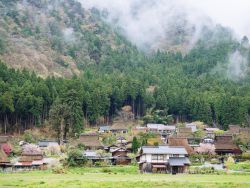
Originally published on metropolis.co.jp on April 2011

Shibuya live house Eggman saw a spike in business after Fox News mistakenly identified it as a nuclear power plant. Photo by Dan Grunebaum
 Amid the rush of charity events and albums, a sobering reality intrudes: Japan’s already pressed entertainment industry faces a long slog getting back to normal.
Amid the rush of charity events and albums, a sobering reality intrudes: Japan’s already pressed entertainment industry faces a long slog getting back to normal.
SMAP can afford to donate millions, and musicians with day jobs are to be commended for quickly throwing together a slew of events, but most artists and entertainment professionals in Tokyo are poorly paid and can’t withstand a further drop in demand. The earthquake is creating a crisis for them as real as the better reported problems affecting Japan’s electronics and auto industries.
“With dates postponed it has had a domino effect right across the board,” explains Johnnie Fingers of Smash, promoter of Fuji Rock Festival, “It has affected equipment rental agencies, venues, hotels, transport companies…”
Smash’s office was unscathed, but a difficult decision was made to cancel many gigs. “Although life in Tokyo is fine and we are far away from the evacuation zone,” Fingers explains, “we feel it is not a time for celebration with so many suffering in Tohoku; with so much rebuilding and healing to do.”
Nightlife was hit hard as clubbers hurried home and panicked artists canceled tours. After closing for two weeks, legendary Nishi-Azabu disco Eleven reopened in late March. “Some clubs in the area have already gone out of business and with many artist cancelations, we’re worried,” says Eleven’s Yuko Ichikawa. “The impact on nightlife is huge, but we’re still going ahead with monthly charity nights.” The next one will be on Friday April 15.
After checking for damage, superclubs Womb and Ageha also reopened with charity events that gathered millions of yen. Though many overseas DJs canceled tours, Ageha’s Mimi Shimada believes “the audience is returning, and we are providing a place to be together.”
Anyone who has attended a quake relief event in recent weeks can attest to the cathartic effect they have offered to traumatized Tokyoites. But some say the rush of giving has to be approached with a sense of caution.
Hostess Entertainment, the record company behind Radiohead and other big name releases in Japan, made a deliberate decision not to put together a charity compilation.
“A charity compilation album of western music in Japan at this time will generate pennies for charity, pennies that will take time to be delivered,” Thus whilst the sentiment may be good, the reality is that it will have negligible positive effect on the relief effort whilst also probably obstructing the path of getting original music back into circulation.”
Shuttered since March 11, Tokyo’s theme parks and blockbuster shows are also taking a tentative approach to reopening. Disneyland, which suffered liquefaction, was reported to be reopening on April 12, in time for DisneySea’s tenth anniversary on April 23.
When his “guitars started dancing” at his Tokyo home, the Blue Man Group’s Callum Grant realized something was up. “In the weeks that followed it was hard to feel when it would be appropriate to reopen,” he says, “especially considering the energy shortages and Fukushima. There was a planned maintenance week, so we decided it would be best to reopen on April 16, with some possible live events around town and fundraising at the theater.”
The Cirque du Soleil’s Zed at Disneyland happened to be on break March 11, and as a “preventive measure” on March 14 sent its performers as well as those from its Yoyogi show Kooza to Macau. “When a natural catastrophe like this earthquake occurs somewhere in the world, Cirque du Soleil, as a company, will look for the most appropriate way to help,” says chief PR officer Chantal Côté. “But […] we let the international organizations do their frontline work first.”
Kooza was due to reopen April 9, with a tentative date of April 16 for relaunching Zed.
Good turnouts for recent events like SonarSound show that people want to come together in times of crisis, but numerous practical issues stand in the way of a return to business as usual. “We’ve postponed the release of albums because aid supplies must be provided before distributing CDs,” Toshie Hagiwara of record giant Avex told Metropolis. The company delayed more than 60 releases and called off 20 gigs.
“How to deal with the long-term lack of power supply is the question for the live concert business,” concluded the Blue Note’s Miho Harasawa. “It’s a big problem.”







